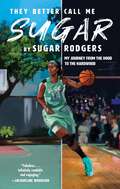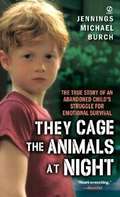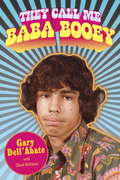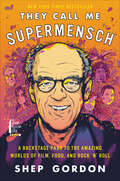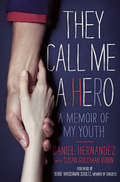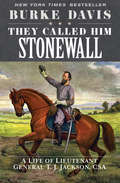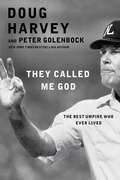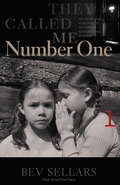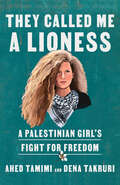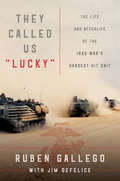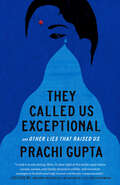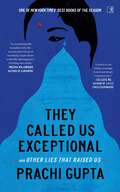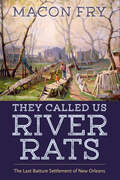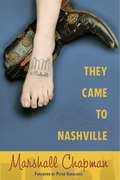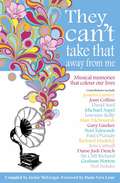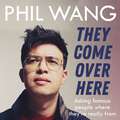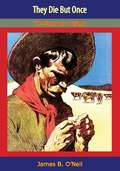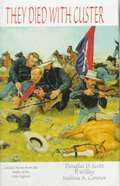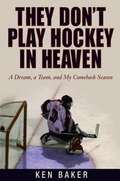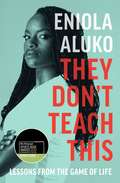- Table View
- List View
They Better Call Me Sugar: My Journey From The Hood To The Hardwood
by Sugar RodgersIn unflinchingly honest prose, Sugar Rodgers shares her inspiring story of overcoming tremendous odds to become an all-star in the WNBA. One of the American Library Association’s Top Ten Quick Picks for Reluctant Young Adul
They Cage the Animals At Night: The True Story of a Child Who Learned to Survive
by Jennings Michael BurchAn autobiography of a boy who learned to reach out for love despite being left in an orphanage and growing up in many foster homes.
They Call Me Baba Booey
by Chad Millman Gary Dell'AbateOne of pop culture's great enduring unsung heroes: Gary Dell'Abate, Howard Stern Show producer, miracle worker, professional good sport, and servant to the King of All Media, for the first time tells the story of his early years and reveals how his chaotic childhood and early obsessions prepared him for life at the center of the greatest show on earth. Baba Booey! Baba Booey! It was a slip of the tongue--that unfortunately was heard by a few million listeners--but in that split second a nickname, a persona, a rallying cry, and a phenomenon was born. Some would say it was the moment Gary Dell'Abate, the long-suffering heroic producer of The Howard Stern Show, for better or worse, finally came into his own. In They Call Me Baba Booey, Dell'Abate explains how his early life was the perfect training ground for the day-to-day chaos that comes with producing the most popular radio show on earth. Growing up on Long Island in the 1970s, the youngest of three boys born to a clinically depressed mother, Gary learned how to fend for himself when under attack. Obsessed with music, he listened with religious intensity to Casey Kasem's Top 40 every Sunday morning, compulsively bought 45s of his favorite songs, and nerdily copied the lyrics into a notebook. Music became an ordering principle to his life, even as the chaos at home got out of hand. Dell'Abate's memoir sketches the trajectory from the obsessive pop-music trivia buff to the man in the beekeeper's mask who handily defeats his opponents playing "Stump the Booey." We learn about the memorable moments in his life that taught him to endure epic bouts of humiliation and get his unique perspective on some of his favorite Stern show episodes--such as the day he nearly killed the Mets mascot while throwing out the first pitch, or the time his mother called Howard's mother and demanded an apology. Hilarious, painful, and eye-opening, it's Gary as you've never seen him before, telling a story that even Stern show insiders can't begin to imagine.From the Hardcover edition.
They Call Me Supermensch: A Backstage Pass to the Amazing Worlds of Film, Food, and Rock 'n' Roll
by Shep GordonIn the course of his storied career as a manager, agent, and producer, Shep Gordon has worked with—and befriended—some of the biggest names in the entertainment industry, from Alice Cooper to Bette Davis, Raquel Welch to Groucho Marx, Blondie to Jimi Hendrix, Sylvester Stallone to Salvador Dalí, Luther Vandross to Teddy Pendergrass. He is also credited with inventing the “celebrity chef,” and has worked with Nobu Matsuhisa, Emeril Lagasse, Wolfgang Puck, Roger Vergé, and many others. In this wonderfully engaging memoir, the captivating entertainment legend recalls his life, from his humble beginnings as a shy, unambitious kid growing up on Long Island to his unexpected rise as one of the most influential and respected personalities in show business, revered for his kindness, charisma—and fondness for a good time. Gordon shares riotous anecdotes and outrageous accounts of his freewheeling, globe-trotting experiences with some of the biggest celebrities of the past five decades, including his first meeting with Janis Joplin in 1968, when the raspy singer punched him in the face. Told with incomparable humor and heart, They Call Me Supermensch is a sincere, hilarious, behind-the-scenes look at the worlds of music and entertainment from a consummate Hollywood insider.
They Call Me a Hero
by Susan Goldman Rubin Daniel HernandezDaniel Hernandez helped save the life of Congresswoman Gabrielle Giffords, and his life experience is a source of true inspiration in this heartfelt memoir."I don't consider myself a hero," says Daniel Hernandez. "I did what I thought anyone should have done. Heroes are people who spend a lifetime committed to helping others." When Daniel Hernandez was twenty years old, he was working as an intern for U.S. Representative Gabrielle Giffords. On January 8, 2011, during a "Congress on Your Corner" event, Giffords was shot. Daniel Hernandez's quick thinking saved Giffords's life until the paramedics arrived and took her to the hospital. Hernandez's bravery and heroism has been noted by many, including President Barack Obama. But while that may have been his most well-known moment in the spotlight, Daniel Hernandez, Jr., is a remarkable individual who has already accomplished much in his young life, and is working to achieve much more. This memoir explores Daniel's life, his character, and the traits that a young person needs to rise above adversity and become a hero like Daniel.
They Called Her Molly Pitcher
by Anne F. RockwellThe rousing true tale of an American Revolution heroine. When her husband joined General Washington’s army, Molly Hays went with him. All through the winter at Valley Forge, Molly watched and listened.<P><P> Then in July, in the battle at Monmouth, she would show how much she had learned. Molly could tell the day would be a scorcher, so she decided to bring water from a nearby spring to the fighting men. More than 50 British soldiers would die of heatstroke that day, but the American soldiers need only cry, “Molly–pitcher!” On one trip through the fighting field, she saw her husband get shot. She satisfied herself that he wouldn’t die from his wound, then took over his job–firing off the cannon! Molly epitomized the feisty, self-reliant spirit of the colonists who would soon win their battle for independence–and her story has rightly become a beloved legend of American history. From the Hardcover edition.
They Called Him Mr. Bones (Fountas & Pinnell Classroom, Guided Reading Grade 4)
by Giorgio Bacchin Leslie BudnickDigger of Dinosaurs Barnum Brown spent his life digging up old bones. You might even recognize some of his famous discoveries. NIMAC-sourced textbook
They Called Him Stonewall: A Life of Lieutenant General T. J. Jackson, CSA (Classics Of War Reprint Ser.)
by Burke DavisThe New York Times–bestselling biography of the South&’s most brilliant and audacious military commander: &“Completely fascinating&” (Kirkus Reviews). With the exception of Robert E. Lee, no Confederate general was more feared or admired than Thomas &“Stonewall&” Jackson. Once derisively known as &“Tom Fool,&” Jackson was an innovative battlefield strategist who struck terror in the hearts of Union army commanders and inspired Confederate soldiers to victory after victory in the early days of the Civil War. A fanatically religious man, Jackson prayed at the start and conclusion of every battle—yet showed no mercy when confronting the enemy. Eccentric, enigmatic, and fiercely intelligent, he became the stuff of legend soon after he died from wounds suffered during the Battle of Chancellorsville; his untimely death would help to change the course of the conflict. Based on a wealth of first-person sources, including Jackson&’s private papers and correspondences, and the memoirs of family, friends, and colleagues, They Called Him Stonewall is a masterful portrait of the man behind the myth.
They Called Me God
by Peter Golenbock Doug HarveyIn the pageantry of baseball, one select group is virtually unknown in the outside world, derided by fans, faced with split-second choices that spell victory or defeat. These men are up-close observers of the action, privy to inside jokes, blood feuds, benches-clearing brawls, and managers' expletive-filled tirades. <P><P>In this wonderful memoir, Hall of Fame umpire Doug Harvey takes us within baseball as you've never seen it, with unforgettable inside stories of baseball greats such as Willie Mays, Sandy Koufax, and Whitey Herzog. <P><P>Doug Harvey was a California farm boy, a high school athlete who nevertheless knew that what he really wanted was to become an unsung hero--a major league umpire. Working his way through the minor leagues, earning three hundred dollars a month, he survived just about everything, even riots in stadiums in Puerto Rico. And while players and other umps hit the bars at night, Harvey memorized the rule book. In 1962, he broke into the bigs and was soon listening to rookie Pete Rose worrying that he would be cut by the Reds and laying down the law with managers such as Tommy Lasorda and Joe Torre. <P><P>This colorful memoir takes the reader behind the plate for some of baseball's most memorable moments, including: · Roberto Clemente's three thousandth and final hit · The "I don't believe what I just saw" heroic three-and-two pinch-hit home run by Kirk Gibson in the '88 World Series · The nail-biting excitement of the close-fought '68 World Series, when Doug called St. Louis Cardinal Lou Brock out at home plate and turned the trajectory of the series But beyond the drama, Harvey turned umpiring into an art. He was a man so respected, whose calls were so feared and infallible, that the players called him God. <P><P>And through it all, he lived by three rules: never take anything from a player, never back down from a call, and never carry a grudge. <P><P>A book for anyone who loves baseball, They Called Me God is a funny and fascinating tale of on- and off-the-field action, peopled by unforgettable characters from Bob Gibson to Nolan Ryan, and a treatise on good umpiring techniques. In a memoir that transcends sport, Doug Harvey tells a gripping story of responsibility, fairness, and honesty.
They Called Me Number One
by Bev SellarsLike thousands of Aboriginal children in the United States, Canada, and elsewhere in the colonized world, Xatsu'll chief Bev Sellars spent part of her childhood as a student in a church-run residential school.These institutions endeavored to "civilize" Native children through Christian teachings; forced separation from family, language, and culture; and strict discipline. Perhaps the most symbolically potent strategy used to alienate residential school children was addressing them by assigned numbers only-not by the names with which they knew and understood themselves.In this frank and poignant memoir of her years at St. Joseph's Mission, Sellars breaks her silence about the residential school's lasting effects on her and her family-from substance abuse to suicide attempts-and eloquently articulates her own path to healing. Number One comes at a time of recognition-by governments and society at large-that only through knowing the truth about these past injustices can we begin to redress them.Bev Sellars is chief of the Xatsu'll (Soda Creek) First Nation in Williams Lake, British Columbia. She holds a degree in history from the University of Victoria and a law degree from the University of British Columbia. She has served as an advisor to the British Columbia Treaty Commission.
They Called Me a Lioness: A Palestinian Girl's Fight for Freedom
by Ahed Tamimi Dena TakruriA Palestinian activist jailed at sixteen after a confrontation with Israeli soldiers illuminates the daily struggles of life under occupation in this moving, deeply personal memoir.&“I cannot even begin to convey the clarity, the intensity, the power, the photographic storytelling of They Called Me a Lioness.&”—Ibram X. Kendi, internationally bestselling author of How to Be an Antiracist&“What would you do if you grew up seeing your home repeatedly raided? Your parents arrested? Your mother shot? Your uncle killed? Try, for just a moment, to imagine that this was your life. How would you want the world to react?&”Ahed Tamimi is a world-renowned Palestinian activist, born and raised in the small West Bank village of Nabi Saleh, which became a center of the resistance to Israeli occupation when an illegal, Jewish-only settlement blocked off its community spring. Tamimi came of age participating in nonviolent demonstrations against this action and the occupation at large. Her global renown reached an apex in December 2017, when, at sixteen years old, she was filmed slapping an Israeli soldier who refused to leave her front yard. The video went viral, and Tamimi was arrested.But this is not just a story of activism or imprisonment. It is the human-scale story of an occupation that has riveted the world and shaped global politics, from a girl who grew up in the middle of it . Tamimi&’s father was born in 1967, the year that Israel began its occupation of the West Bank and he grew up immersed in the resistance movement. One of Tamimi&’s earliest memories is visiting him in prison, poking her toddler fingers through the fence to touch his hand. She herself would spend her seventeenth birthday behind bars. Living through this greatest test and heightened attacks on her village, Tamimi felt her resolve only deepen, in tension with her attempts to live the normal life of a daughter, sibling, friend, and student.An essential addition to an important conversation, They Called Me a Lioness shows us what is at stake in this struggle and offers a fresh vision for resistance. With their unflinching, riveting storytelling, Ahed Tamimi and Dena Takruri shine a light on the humanity not just in occupied Palestine but also in the unsung lives of people struggling for freedom around the world.
They Called Us "Lucky": The Life and Afterlife of the Iraq War's Hardest Hit Unit
by Jim DeFelice Ruben GallegoFrom the Arizona Congressman, a "powerful" and "searing" (PW) chronicle of the eternal bonds forged between the Marines of Lima Company, the hardest-hit unit of the Iraq WarAt first, they were “Lucky Lima.” Infantryman Ruben Gallego and his brothers in Lima Company—3rd Battalion, 25th Marines, young men drawn from blue-collar towns, immigrant households, Navajo reservations—returned unscathed on patrol after patrol through the increasingly violent al Anbar region of Iraq, looking for weapons caches and insurgents trying to destabilize the nascent Iraqi government. After two months in Iraq, Lima didn't have a casualty, not a single Purple Heart, no injury worse than a blister. Lucky Lima.Then, in May 2005, Lima’s fortunes flipped. Unknown to Ruben and his fellow grunts, al Anbar had recently become a haven for al Qaeda in Mesopotamia. The bin Laden-sponsored group had recruited radicals from all over the world for jihad against the Americans. On one fateful day, they were lured into a death house; the ambush cost the lives of two men, including a platoon sergeant. Two days later, Ruben’s best friend, Jonathon Grant, died in an IED attack, along with several others. Events worsened from there. A disastrous operation in Haditha in August claimed the lives of thirteen Marines when an IED destroyed their amphibious vehicle. It was the worst single-day loss for the Marines since the 1983 Beirut bombings. By the time 3/25 went home in November, it had lost more men than any other single unit in the war. Forty-six Marines and two Navy Corpsmen serving with the battalion in Iraq were killed in action during their roughly nine-month activation.They Called Us “Lucky” details Ruben Gallego’s journey and includes harrowing accounts of some of the war’s most costly battles. It details the struggles and the successes of Ruben—now a member of Congress—and the rest of Lima Company following Iraq, examining the complicated matter of PTSD. And it serves as a tribute to Ruben’s fallen comrades, who made the ultimate sacrifice for their country. With its gripping accounts of some of the war's most costly battles, They Called Us 'Lucky' is a must-read for anyone interested in military history and the politics of war. It offers a firsthand perspective on the Iraq War and the struggles faced by soldiers like Ruben Gallego, who served in the hardest hit company of the hardest hit battalion of the war and occupation.
They Called Us Exceptional: And Other Lies That Raised Us
by Prachi GuptaAn Indian American daughter reveals how the dangerous model minority myth fractured her family in this &“searingly honest memoir that manages to be at once a scalding indictment and a heartfelt love letter&” (Scott Stossel, author of My Age of Anxiety). ONE OF THE BEST BOOKS OF THE SEASON: The New York Times, The Washington Post, The Boston Globe, Bustle&“In examining with boundless love the secrets and sorrows of one family, Gupta shows us the life-altering power of telling one&’s truth.&”—Megha Majumdar, author of A Burning How do we understand ourselves when the story about who we are supposed to be is stronger than our sense of self? What do we stand to gain—and lose—by taking control of our narrative? These questions propel Prachi Gupta&’s heartfelt memoir and can feel particularly fraught for immigrants and their children who live under immense pressure to belong in America. Prachi Gupta&’s family embodied the American Dream: a doctor father and a nurturing mother who raised two high-achieving children with one foot in the Indian American community, the other in Pennsylvania&’s white suburbia. But their belonging was predicated on a powerful myth: that Asian Americans have perfected the alchemy of middle-class life, raising tight-knit, ambitious families that are immune to hardship. Molding oneself to fit this perfect image often comes at a steep but hidden cost. In They Called Us Exceptional, Gupta articulates the dissonance, shame, and isolation of being upheld as an American success story while privately navigating traumas invisible to the outside world. Gupta addresses her mother throughout the book, weaving a deeply vulnerable personal narrative with history, postcolonial theory, and research on mental health, to show how she slowly made sense of her reality and freed herself emotionally and physically from the pervasive, reductive myth that had once defined her. But, tragically, the act that liberated Gupta was also the act that distanced her from those she loved most. By charting her family&’s slow unraveling and her determination to break the cycle, Gupta shows how traditional notions of success keep us disconnected from ourselves and one another—and passionately argues why we must orient ourselves toward compassion over belonging.
They Called Us Exceptional: And Other Lies That Raised Us
by Prachi GuptaAn Indian American daughter reveals how the dangerous model minority myth fractured her family in this "searingly honest memoir that manages to be at once a scalding indictment and a heartfelt love letter" (Scott Stossel, author of My Age of Anxiety). "In examining with boundless love the secrets and sorrows of one family, Gupta shows us the life-altering power of telling one's truth."--Megha Majumdar, author of A Burning How do we understand ourselves when the story about who we are supposed to be is stronger than our sense of self? What do we stand to gain--and lose--by taking control of our narrative? These questions propel Prachi Gupta's heartfelt memoir and can feel particularly fraught for immigrants and their children who live under immense pressure to belong in America. Prachi Gupta's family embodied the American Dream: a doctor father and a nurturing mother who raised two high-achieving children with one foot in the Indian American community, the other in Pennsylvania's white suburbia. But their belonging was predicated on a powerful myth: that Asian Americans have perfected the alchemy of middle-class life, raising tight-knit, ambitious families that are immune to hardship. Molding oneself to fit this perfect image often comes at a steep but hidden cost. In They Called Us Exceptional, Gupta articulates the dissonance, shame, and isolation of being upheld as an American success story while privately navigating traumas invisible to the outside world. Gupta addresses her mother throughout the book, weaving a deeply vulnerable personal narrative with history, postcolonial theory, and research on mental health, to show how she slowly made sense of her reality and freed herself emotionally and physically from the pervasive, reductive myth that had once defined her. But, tragically, the act that liberated Gupta was also the act that distanced her from those she loved most. By charting her family's slow unraveling and her determination to break the cycle, Gupta shows how traditional notions of success keep us disconnected from ourselves and one another--and passionately argues why we must orient ourselves toward compassion over belonging.
They Called Us River Rats: The Last Batture Settlement of New Orleans
by Macon FryThey Called Us River Rats: The Last Batture Settlement of New Orleans is the previously untold story of perhaps the oldest outsider settlement in America, an invisible community on the annually flooded shores of the Mississippi River. This community exists in the place between the normal high and low water line of the Mississippi River, a zone known in Louisiana as the batture. For the better part of two centuries, batture dwellers such as Macon Fry have raised shantyboats on stilts, built water-adapted homes, foraged, fished, and survived using the skills a river teaches. Until now the stories of this way of life have existed only in the memories of those who have lived here. Beginning in 2000, Fry set about recording the stories of all the old batture dwellers he could find: maritime workers, willow furniture makers, fishermen, artists, and river shrimpers. Along the way, Fry uncovered fascinating tales of fortune tellers, faith healers, and wild bird trappers who defiantly lived on the river. They Called Us River Rats also explores the troubled relationship between people inside the levees, the often-reviled batture folks, and the river itself. It traces the struggle between batture folks and city authorities, the commercial interests that claimed the river, and Louisiana’s most powerful politicians. These conflicts have ended in legal battles, displacement, incarceration, and even lynching. Today Fry is among the senior generation of “River Rats” living in a vestigial colony of twelve “camps” on New Orleans’s river batture, a fragment of a settlement that once stretched nearly six miles and numbered hundreds of homes. It is the last riparian settlement on the Lower Mississippi and a contrarian, independent life outside urban zoning, planning, and flood protection. This book is for everyone who ever felt the pull of the Mississippi River or saw its towering levees and wondered who could live on the other side.
They Came to Nashville
by Marshall Chapman Peter GuralnickMarshall Chapman knows Nashville. A musician, songwriter, and author with nearly a dozen albums and a bestselling memoir under her belt, Chapman has lived and breathed Music City for over forty years. Her friendships with those who helped make Nashville one of the major forces in American music culture is unsurpassed. And in her new book, They Came to Nashville, the reader is invited to see Marshall Chapman as never before--as music journalist extraordinaire.In They Came to Nashville, Chapman records the personal stories of musicians shaping the modern history of music in Nashville, from the mouths of the musicians themselves. The trials, tribulations, and evolution of Music City are on display, as she sits down with influential figures like Kris Kristofferson, Emmylou Harris, and Miranda Lambert, and a dozen other top names, to record what brought each of them to Nashville and what inspired them to persevere. The book culminates in a hilarious and heroic attempt to find enough free time with Willie Nelson to get a proper interview. Instead, she's brought along on his raucous 2008 tour and winds up onstage in Beaumont, Texas singing "Good-Hearted Woman" with Willie.They Came to Nashville reveals the daily struggle facing newcomers to the music business, and the promise awaiting those willing to fight for the dream.Co-published with the Country Music Foundation Press
They Came to Nashville (Co-published with the Country Music Foundation Press)
by Marshall ChapmanMarshall Chapman knows Nashville. A musician, songwriter, and author with nearly a dozen albums and a bestselling memoir under her belt, Chapman has lived and breathed Music City for over forty years. Her friendships with those who helped make Nashville one of the major forces in American music culture are genuine and heartfelt, her insights unsurpassed. In her new book, They Came to Nashville, the reader is invited to see Marshall Chapman as never before: as music journalist extraordinaire. Here Chapman captures the personal stories of musicians who have shaped the modern history of music in Nashville, from the mouths of the artists themselves. Their tribulations and triumphs are revealed against the backdrop of a forever-evolving Music City, as Chapman sits down with icons like Kris Kristofferson and Emmylou Harris, new stars like Miranda Lambert, and a dozen other top names to ask what brought each of them to Nashville and what inspired them to persevere. The book culminates with Chapman's heroic and hilarious attempt to schedule a proper interview with original Outlaw Willie Nelson. Instead, she's brought along on Willie's raucous 2008 tour and winds up on stage with him in Beaumont, Texas, singing "Good Hearted Woman."They Came to Nashville reveals the daily struggles facing newcomers to the music business—and the promise awaiting those willing to fight for their dream.
They Can't Take That Away from Me: Musical Memories That Colour Our Lives
by Jackie McGregorDoes a particular song take you back to a certain time and place? More than 100 A-list celebrities were asked what songs bring back special memories. Film star Joan Collins The Way You Look Tonight reminds her of the first dance at her wedding to Percy Gibson. TV presenter Richard Madeley remembers playing guitar at the local folk club when he hears American Pie by Don McLean. Pavarotti's rendition of Nessun Dorma sets off memories of the 1990 World Cup for Gary Lineker Joanna Lumley thinks of her childhood in the Far East whenever she hears Nat King Cole singing Stardust. Music is one of the most evocative forces on earth. A whole cascade of memories can be brought on by a single tune. They Can't Take That Away From Me is a musical memory tour with the stars to a place where it is yesterday once more.Celebrities include Kim Catrall, Denise Welch, Cliff Richard, Dame Judi Dench, Graham Norton, Joanna Lumley, Joan Collins, Chris Tarrant, David Soul, Jane McDonald, Michael Aspel, Lorraine Kelly, Alan Titchmarsh,Neil Sedaka, Daniel O'Donnell, Gary Lineker, Noel Edmonds, Paul O Grady, Richard Madeley, Angela Griffin, Michael Palin, Rula Lenska, Adele Parks, Joanna Trollope and Lynda Bellingham
They Can't Take That Away from Me: Musical Memories That Colour Our Lives
by Jackie McGregorDoes a particular song take you back to a certain time and place? More than 100 A-list celebrities were asked what songs bring back special memories. Film star Joan Collins The Way You Look Tonight reminds her of the first dance at her wedding to Percy Gibson. TV presenter Richard Madeley remembers playing guitar at the local folk club when he hears American Pie by Don McLean. Pavarotti's rendition of Nessun Dorma sets off memories of the 1990 World Cup for Gary Lineker Joanna Lumley thinks of her childhood in the Far East whenever she hears Nat King Cole singing Stardust. Music is one of the most evocative forces on earth. A whole cascade of memories can be brought on by a single tune. They Can't Take That Away From Me is a musical memory tour with the stars to a place where it is yesterday once more.Celebrities include Kim Catrall, Denise Welch, Cliff Richard, Dame Judi Dench, Graham Norton, Joanna Lumley, Joan Collins, Chris Tarrant, David Soul, Jane McDonald, Michael Aspel, Lorraine Kelly, Alan Titchmarsh,Neil Sedaka, Daniel O'Donnell, Gary Lineker, Noel Edmonds, Paul O Grady, Richard Madeley, Angela Griffin, Michael Palin, Rula Lenska, Adele Parks, Joanna Trollope and Lynda Bellingham
They Come Over Here: Asking Famous People Where They're Really From
by Phil WangComedian Phil Wang takes us through a funny and incisive look at race and belonging. Inspired by his forthcoming book Sidesplitter, Phil and a panel of guests explore the subjects of food, music, politics, nature and empire, and what they mean in today's multicultural society.Guests include comedian and Budpod co-host Pierre Novellie, singer-songwriter Emmy the Great, bestselling author and journalist Sathnam Sanghera, celebrity pastry chef Cherish Finden and many more. (P)2021 Hodder & Stoughton Limited
They Dared to Be Different
by Anna Talbott McphersonEighteen stirring stories from the lives of men and women whose devotion to Christ can best be described as a consuming passion. Herein is recorded the stirring account of Ira D. Sankey's composition of "The Ninety and Nine" and the fearless preaching of Catherine Booth, and key events in the lives and ministries of Charles Spurgeon, Charles Wesley, Andrew Murray, Elizabeth Fry and fourteen others. Inspiring and challenging.
They Die But Once: The Story of a Tejano
by James B. O’NeilHere is an utterly new departure in biography of the Old West. Writing in the hangered, hard-boiled style made famous by Hemingway and O’Hara, James B. O’Neil has succeeded in transferring the color and idiom of the wild and roaring days of the West to the printed page. They Die But Once is authentic biography—the life story of Jeff Ake, last of the Western gunfighters and vaqueros—yet because of the facility with which the author has translated the spirit of the period into language attuned to the twentieth century, the story moves with all the breathtaking speed of a current gangster thriller. O’Neil discards all the saccharine sentimentality that has clouded the real West of the seventies and presents Jeff Ake’s story in the sharp, biting understatement of contemporary prose.With the reek of a Texan prison camp in his nostrils, Jeff Ake rode, rampant unreconstruction in his heart, away from the looted Federal Treasury in Austin, with three hundred of Price’s army, into Mexico, where he joined Porfirio Diaz’s bodyguard. Back he came, with horse-trappings of human Comanche-hide and six-guns blazing, to enter the bloody range wars. Hell-bent-for-leather, he rode up and down the range, while pistols barked their staccato tale of sudden death.In They Die But Once, you will find the reason why Pat Barrett died; the sad tale of the bullet of Billy the Kid; the true cause of John Wesley Hardin’s capture. Bill Longley, Jim Gillett, John Ringo, Kit Carson, Jesse and Frank James, General Custer, Gene Rhodes and Roy Bean (“The Law West of the Pecos”) live and fight and love and die in the thrill-studded pages of They Die But Once. You who have read and not quite believed Clarence Mulford and William Patterson White, hear and know: What they told is only what they dared tell, Jeff Ake tells even more—and can prove a lot of it!
They Died with Custer: Soldiers' Bones from the Battle of the Little Bighorn
by Douglas D. Scott P. Willey Melissa A. ConnorMore than a hundred years after the Battle of the Little Bighorn, its secrets continue to unfold. In this book, Douglas D. Scott, P. Willey, and Melissa A. Connor blend historic sources, archeological evidence, and physical data to present new revelations about the men who rode and died with Custer. Although dead men tell no tales, their skeletons whisper entire life stories. Through painstaking analysis of the skeletal remains, the authors construct composite biographies of the soldiers, identifying their true ages, heights, states of health, and how they died. A vast selection of illustrations, including photographs, battlefield maps, drawings, & graphs, enhance the discussion. The authors also move beyond individual stories to consider our views regarding the appropriate treatment for the dead. They explain how Custer Battlefield National Monument, now Little Bighorn Battlefield National Monument, has always reflected shifts in cultural values. The planned monument to the American Indians who fought against the Seventh Cavalry is perhaps the most notable example. THEY DIED WITH CUSTER is important because it humanizes the cavalrymen who until now have been mere statistics. The first study of its kind, this volume not only makes a significant contribution to Little Bighorn scholarship but also offers a general model for new ways to interpret the past. Douglas D. K. Scott is Great Plains Team Leader, Midwest Archeological Center, National Park Service. He is widely know as an expert on military archeology. P. Willey is Professor of Anthropology, Chico State University, California. His specialties include forensic anthropology and human skeletal biology. Melissa A. Connor, an Archeologist with the Midwest Archeological Center, is currently studying the application of archeology to forensic work and the recovery of recent human remains.
They Don't Play Hockey in Heaven: A Dream, A Team, and My Comeback Season
by Ken BakerKen Baker wanted nothing more than to play ice hockey with the pros--until a brain tumor cut his dreams short while in college. After surgery and several years of rehab, Baker, who in high school was a top prospect for the U.S. Olympic team, put his successful journalism career on hold to attempt the seemingly impossible: a comeback. He moved away from his family to become the third-string goalie for the Bakersfield Condors, an AA-level minor-league team in the dusty oil town of Bakersfield, California. At the age of thirty-one, Baker became the oldest rookie in all of pro-hockey, facing 1000-m.p.h. slap shots and long bus rides, hostile fans and cheap motel rooms, body bruises and battle-worn teammates.
They Don't Teach This
by Eniola Aluko*SHORTLISTED FOR THE TELEGRAPH SPORTS BOOK AWARDS*Eni Aluko: 102 appearances for England women's national football team. First female pundit on Match of the Day. UN Women UK ambassador. Guardian columnist. First class honors law degree. Now an inspirational author.They Don't Teach This steps beyond the realms of memoir to explore themes of dual nationality and identity, race and institutional prejudice, success, failure and faith. It is an inspiring manifesto to change the way readers and the future generation choose to view the challenges that come in their life applying life lessons with raw truths of Eni's own personal experience.'A fascinating examination of her multiple identities - British and Nigerian, a girl in a boy's world, footballer and academic, a kid from an estate with upper-middle-class parents, a God-fearing rebel... Aluko does not hold back - and few people from the football establishment emerge with their reputation intact' Guardian
